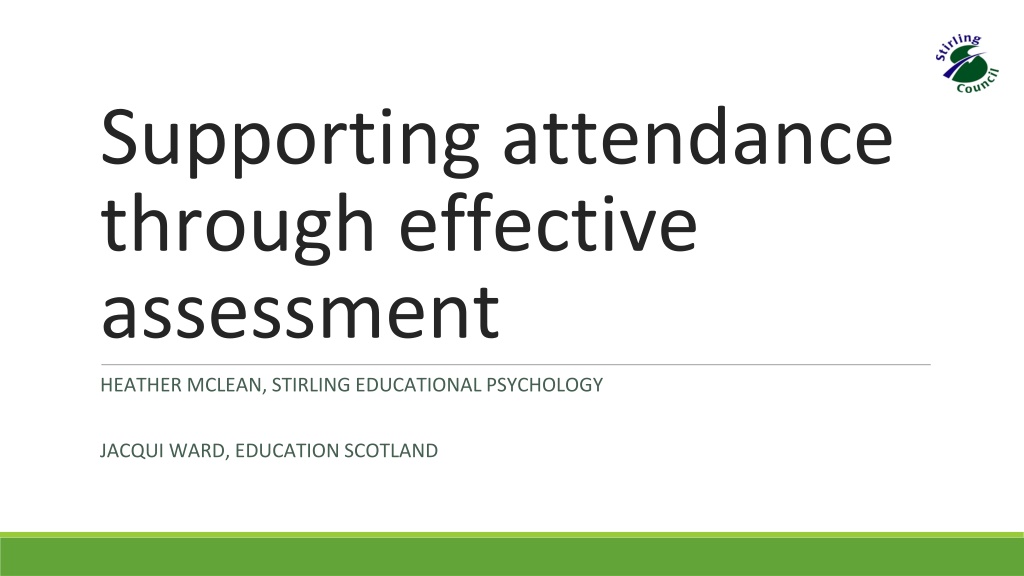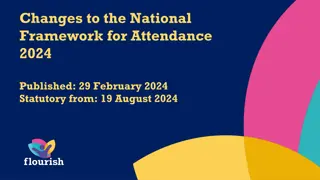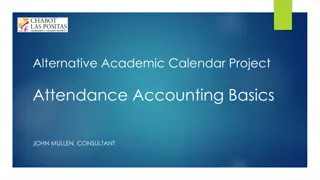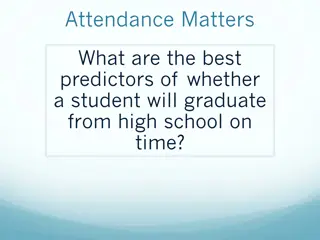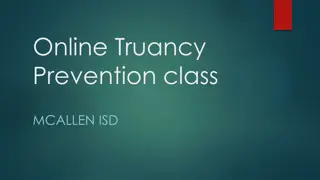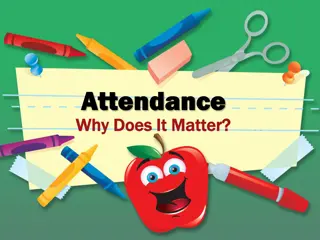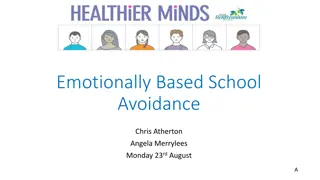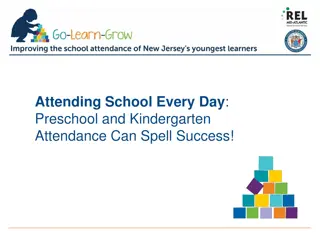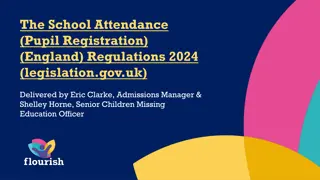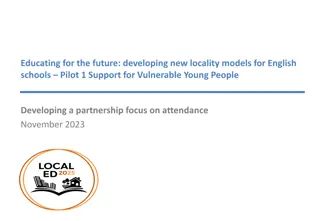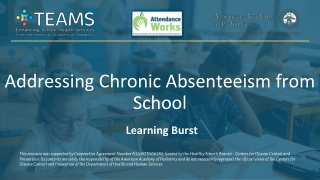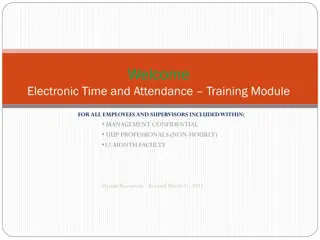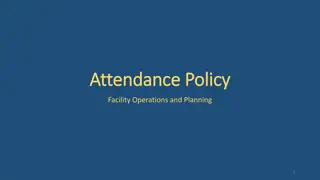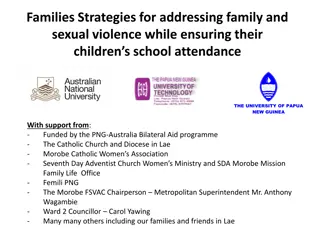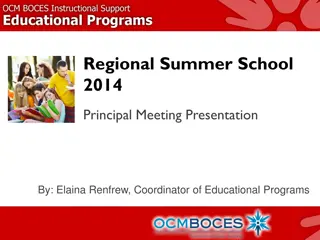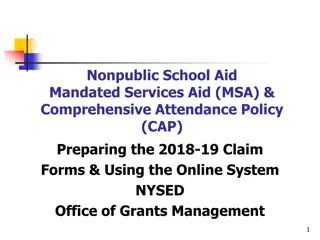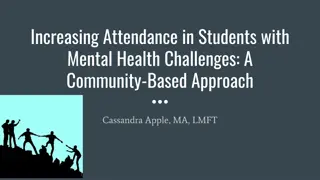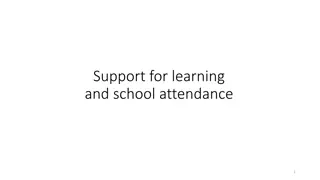Understanding School Attendance Challenges and Strategies
Explore the complexities of school attendance issues, including underlying reasons such as health, family, and school-related factors. Learn how language and assessment play a crucial role in supporting students' attendance and well-being. Gain insights into identifying various behaviors related to attendance problems and discover effective strategies to promote consistent participation in educational activities.
- School attendance
- Student well-being
- Assessment strategies
- Educational activities
- Attendance challenges
Download Presentation

Please find below an Image/Link to download the presentation.
The content on the website is provided AS IS for your information and personal use only. It may not be sold, licensed, or shared on other websites without obtaining consent from the author. Download presentation by click this link. If you encounter any issues during the download, it is possible that the publisher has removed the file from their server.
E N D
Presentation Transcript
Supporting attendance through effective assessment HEATHER MCLEAN, STIRLING EDUCATIONAL PSYCHOLOGY JACQUI WARD, EDUCATION SCOTLAND
The context WHAT IS MEANT BY SCHOOL ATTENDANCE? Attendance is participation in a programme of educational activities arranged and agreed by the school Scottish Government 2007, p4 Scottish Government, 2019
Mentimeter What terms do you use/have you heard to describe challenges with school attendance? Go to Menti.com Enter the code 8663 3251 https://www.menti.com/aluhr5me3s5p Attendance terms - Mentimeter
Language matters moving beyond within child models We need to consider: School refusal behaviour Avoiding situating the problem within the child Language which infers blame School non attendance behaviour Are we pre-empting? Being curious School What do young people tell us? phobia/truancy Baker and Bishop (2015), Elliot and Place (2019)
A range of behaviours observed CYP rarely leaves their bedroom Prolonged absence Increased sporadic absence Notable pattern of absence Occasional absence from school Missing a small number of lessons Being late to school Hertfordshire Council, 2021, Thambirajah et al 2008 Can include occasional avoidance or full attendance with distressed behaviour at home
Underlying risks and reasons for school attendance challenges Individual The underlying reasons are usually multifactorial Home School (e.g. Baker and Bishop, 2015, Havik et al 2015, Ingul et al, 2018)
Underlying reasons: some examples Individual Home School Illness Ill health within the family Bullying Mental health difficulty e.g. anxiety Changes in the family setting The curriculum Loss and bereavement Transition supports Experiencing separation difficulties Being a young carer Transport Being at a transition point Availability of other peers Relationships Experiencing difficulties with learning Further examples: Tina Rae (2020), West Sussex Council (2022)
Considering resilience and the protective factors Individual What strengths and resources are already there? Home School e.g. West Sussex Council (2022)
The response to intervention model Kearney and Graczyk (2014) Tier three Intervention for those already displaying a school non attendance problem Targeted support for students at risk of an attendance problem Tier two Tier one Universal promoting attendance and prevention
Early intervention and prevention LOOKING AT DATA Considering thresholds Exploring patterns Poverty ASN Looking through a variety of lenses Vulnerable groups
Early intervention and prevention Young people at the centre THE SCHOOL CLIMATE Parents and carers Hearing the voices of all in the community to consider key factors including: The environment including felt safety School staff Relationships with and among staff Relationships among peers Partners and the wider community Curriculum Participation (e.g. see Lauchlan, 2003, Ingur et al. 2019, Consider climate surveys ThingLink Pellegrini, 2007, Kearney and Graczyk, 2014)
Mentimeter - What assessment processes are you already using? Go to menti.com Enter code 8122 4569 https://www.menti.com/alzut66 oy4h2 Assessment attendance - Mentimeter
A functional approach to assessment A functional approach to non-attendance such as the model proposed by Kearney (2001) may provide a way forward. Kearney and Silverman (1990) developed a model which suggests that the possible reasons CYPs may be reluctant to attend school can generally be categorised into four main areas: A The CYP wants to avoid things at school that make them feel anxious or depressed A B C D The CYP wants to avoid things at school that make them feel anxious or depressed The CYP wants to avoid difficult social situations or to avoid being evaluated The CYP wants to gain attention from parents / caregivers The CYP wants to gain tangible rewards outside of school
Assessment - a dynamic process Step 1 Gathering Information Step 3 Planning supports Step 2 Clarify Function
Keeping the young person s voice at the centre Scottish Government, 2022
Push and pull factors School Home PUSH PULL Towards attending school Away from school PULL PUSH Away from school Towards staying at home e.g. West Sussex Guidance, 2022
Some ideas for assessment with young people Exploring personal strengths e.g. strengths cards Myself as a learner Scale (MALS) Exploring the function of non attendance School Refusal Assessment Scale R (C) Particular assessments e.g. Spence Anxiety Scale Exploring risk and resilience e.g. School Wellbeing Cards (Dr J Holder) Graphing the journey Exploring the learning context Red, amber, green timetable Emotional thermometers/scales Maps of school/talk though of school day Drawing the ideal school Consider carefully other Additional Support Needs which may impact on gathering views
Further ideas for assessment Parent versions of questionnaires e.g. SRAS- R, Spence Anxiety Scale Round robin of staff with key questions Liaison with key staff from transition Assessments of learning to consider progress in curriculum Analysis of school reports School connectedness questionnaires Key questions for parents e.g. Sunday night/Monday morning (see Herts, 2021, Rae, 2020) Parents as collaborators e.g. Drawing the ideal Safe School (Dudley EPS, 2020) Consider when multiagency collaboration is needed
The School Refusal Assessment Scale - Revised Developed by Kearney and Silverman (1993), Revised Kearney and Albano (2007) Free to access online Has a parent/carer version and young person s version Each statement is answered on a 6 point scale from never to always Allows consideration of which functions are most predominant for each individual
SRAS R Some Considerations The language when presenting this to a young person The importance of the conversation Considering different views and being curious Can be used as part of the information gathering process, not on it s own Reliability and validity
What next? Planning to support assessment USING INFORMATION TO SUPPORT PLANNING Bringing together the views of everyone to formulate a plan Parents and carers Ensure the plan addresses the key functions Keep the young person at the heart of this Young person Think about building upon strengths Focus on the push and pull factors to support Keep the 5 GIRFEC questions in mind consider when partners are needed School staff Partners
Discussion Next steps What is one thing you could take forward to support attendance in the context you are working in?
References and Helpful Resources Baker, M. and Bishop, F., L. (2015) Out of school: a phenomenological exploration of extended non-attendance, Educational Psychology in Practice, 31:4, 354-368, Dudley Educational Psychology Service (2020). Drawing the Ideal Safe School. Elliott, J.G. and Place, M. (2019) 'Practitioner review : school refusal : developments in conceptualisation and treatment since 2000.', Journal of child psychology and psychiatry., 60 (1). pp. 4-15. Forth Valley Interactive Assessment Guidance Tool (2022) ThingLink Havik, T., Bru, E., & Ertesv g, S. K. (2015). School factors associated with school refusal- and truancy-related reasons for school non-attendance. Social Psychology of Education: An International Journal, 18(2), 221 240 Hertfordshire County Council: Integrated Services for Learning. (2021). Emotionally Based School Avoidance: Guidance for schools. Ingul, J. M., Havik, T., & Heyne, D. (2019). Emerging school refusal: A school-based framework for identifying early signs and risk factors. Cognitive and Behavioral Practice, 26(1), 46-62. Kearney, C. A. (2001). School refusal behavior in youth: A functional approach to assessment and treatment. American Psychological Association Kearney, C. A. and Albano, A M (2007). When children refuse school: Assessment. Oxford University Press.
References and Helpful Resources Kearney, C. A., & Graczyk, P. (2014). A response to intervention model to promote school attendance and decrease school absenteeism. Child & Youth Care Forum, 43(1), 1 25. Kearney, C. A. and Silverman, W. K (1993). Measuring the function of school refusal behaviour: The School Refusal Assessment Scale, Journal of Clinical Child Psychology, 24 (4): 235-245 Kearney, C.A. and Silverman, W.K. (1990) A preliminary analysis of a functional model of assessment and treatment of school refusal behaviour. Behaviour Modification 14, 340-366. Lauchlan, F. (2003). Responding to chronic non-attendance: A review of intervention approaches. Educational Psychology in Practice, 19(2), 133. Pellegrini, D. (2007). School non-attendance: definitions, meanings, responses, interventions. Educational Psychology in Practice, 23(1), 63-77. Rae, T. (2020). Understanding and supporting children and young people with Emotionally Based School Avoidance (EBSA) Scottish Government (2022). Getting it right for every child (GIRFEC) Practice Guidance 1 Using the National Practice Model Scottish Government (2019). Presumption to provide education in a mainstream setting: guidance. Scottish Government (2007). Included, Engaged, Involved. Part One: Attendance in Scottish Schools. Thambirajah M,S., Grandison K.J., and De-Hayes L. (2008) Understanding School refusal: a handbook for professionals in education, Health and Social Care. Jessica Kingsley, London, UK. West Sussex Council (2022). EBSA Guidance Document Updated. Emotionally Based School Avoidance | West Sussex Services for Schools
